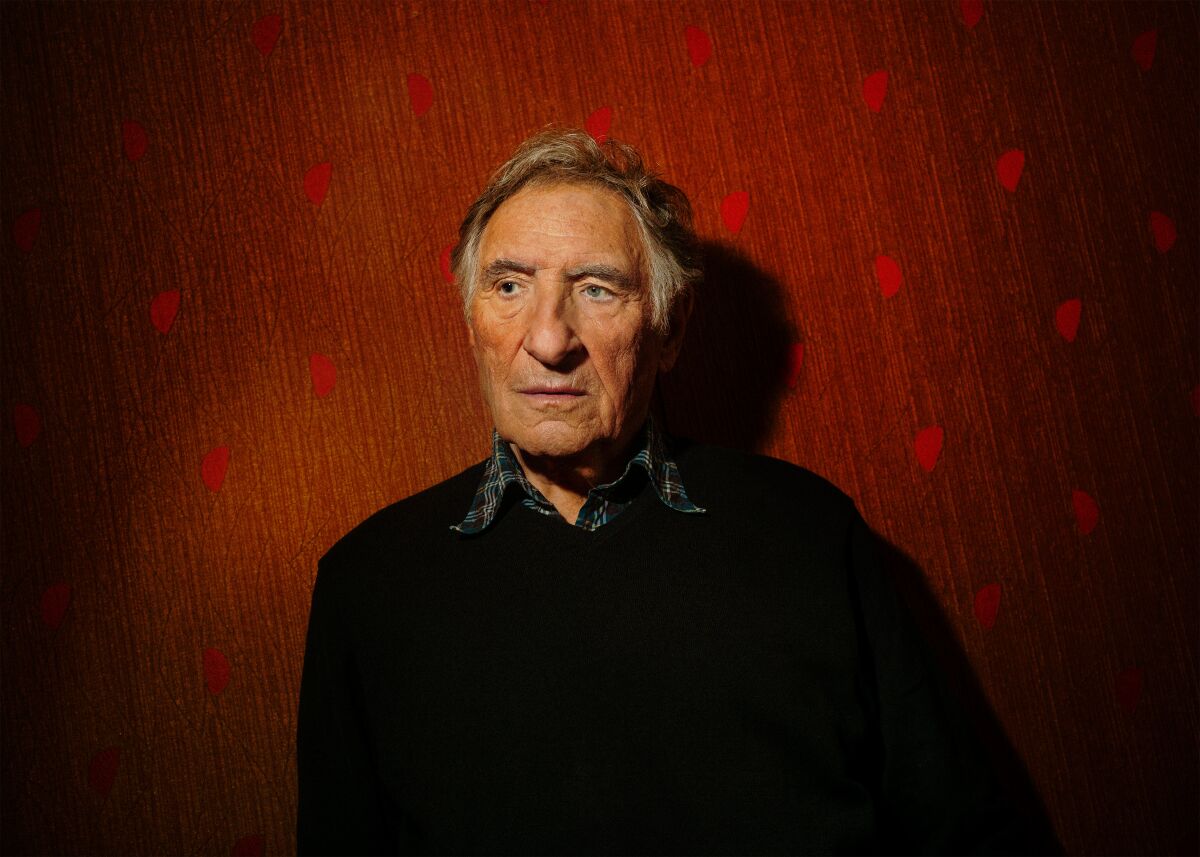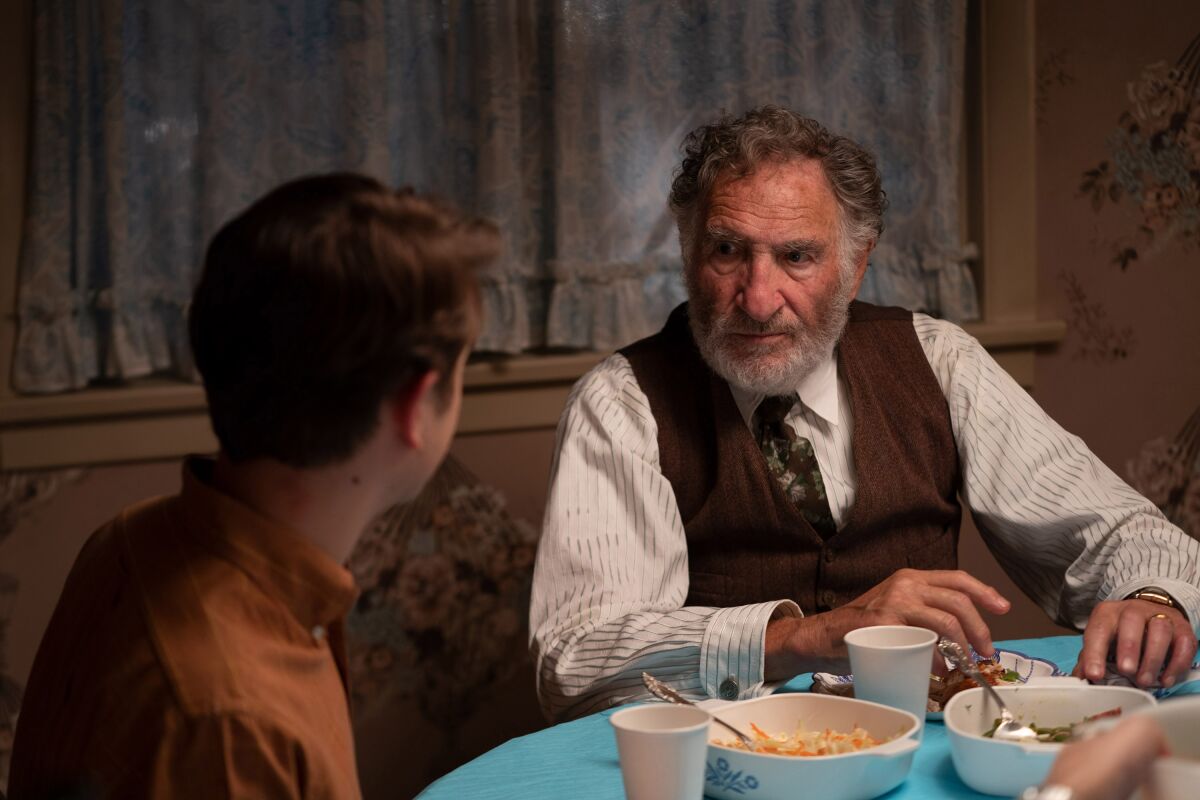At about the 47-minute mark of Steven Spielberg’s “The Fabelmans,” Judd Hirsch strolls in and makes the movie his own. Playing Boris, the cantankerous, Old World great-uncle of the movie’s teenage Spielberg surrogate, Sam (Gabriel LaBelle), Hirsch kvetches about his days as a circus lion tamer, rends his undershirt in grief for his recently departed sister, and, most important, tells Sam something essential about art: You can’t do it halfway. And it must hurt. “Art will give you crowns in heaven, and laurels on Earth,” he tells the boy, who is a little frightened by the man’s intensity. “But it will tear your heart out.”
Hirsch, roaring like a lion at 87, isn’t even in the movie for 10 minutes. But he leaves such an impression that he’s primed to join other supporting acting Oscar winners Judi Dench (eight minutes in “Shakespeare in Love”) and Beatrice Strait (five minutes and two seconds in “Network”) who made the most of their brief time onscreen. “I have no idea why he cast me,” Hirsch recently told The Envelope before a SAG screening of “The Fabelmans” in Hollywood. “The last thing I said to him was, ‘Thank you for parachuting me into this movie.’”
Hirsch’s performance may be brief, but his stories are not. Over the course of a lively hour, the man who came to prominence on the beloved sitcom “Taxi” (1978-1983) and was nominated for an Oscar as a tough-love therapist in “Ordinary People” (1980) weaved tales about the surrealness of growing up in Coney Island (“It wasn’t a normal upbringing, let’s put it this way”); his first love, physics (“I went to math because I always wanted the right answer”); and his abiding passion for the theater (“There’s no close-up, and there’s no way in which anybody can direct themself to you on stage”). Much like Boris, Hirsch is a whirlwind of energy.
As for why he was cast, Spielberg says it was an easy call for him and co-writer and producer Tony Kushner.

Judd Hirsch.
(David Billet / For The Times)
“When I asked casting director Cindy Tolan who should play Uncle Boris, she didn’t hesitate: Judd Hirsch, of course,” Spielberg recalled via email. “Tony and I immediately realized that, without saying it, we’d written the part for him. So it was Judd or bust, and luckily he liked the script and threw in with us.”
The two had actually met 50 years ago. Hirsch was at a Universal Pictures office in New York, about to secure his first starring role in a TV movie called “The Law.” A Universal employee showed Hirsch around the office, stopping at a small desk where a young man was hunkered down with his screenplay. “This is Mr. Spielberg,” she told Hirsch. “He’ll be big.” “Hi,” the unassuming Spielberg said. The screenplay was “Jaws.” After the “Fabelmans” shoot, Spielberg sent Hirsch a note: “I hope it’s not another 50 years before we get together again.”
“For me, it was a real honor to work with him,” Spielberg said. “He’s a grand master of stage, film and television, and a joy to work with. He’s ferocious and funny and heartbreaking, and he has an incandescent soul.”
Hirsch described a sort of itinerant upbringing in New York, bouncing between the Bronx and Coney Island, attending a new school almost every year. “The word ‘permanent’ did not exist in our family,” he said. “Wherever we were, we were not going to be there next year.” His imagination ran wild as he played jokes on strangers and learned to appreciate the value of telling stories. Trained to be an engineer — he earned a physics degree at the City College of New York — he soon found himself gravitating toward acting.

Judd Hirsch “parachutes” into “The Fabelmans” for only about 10 minutes.
(Merie Weismiller Wallace / Universal Pictures)
“That was sort of a temporary idea as well,” he said. “It was like, ‘Maybe I can do this. For how long, I don’t know.’ I didn’t know whether I would work as an actor. I knew that I wanted to learn what I thought I was doing anyway with my friends, like kidding around with made-up languages. I thought I could add to that by learning acting.”
It was also a way to explore what was going on in his head, namely an insatiable curiosity.
“I didn’t learn how to play the piano,” Hirsch said. “I didn’t learn how to direct or make scenery. I learned something about expression, because when you’re a kid, you’re not taken seriously. If you want to express yourself, every teacher that you have in public school will suppress it because you’re out of line. You don’t say, ‘Why does two and two make four?’ I did that. I would question things and they’d say, ‘Sit down.’”
When Hirsch asked Spielberg what his great-uncle sounded like, Spielberg responded, “We hardly understood a word he said.” But there was enough on the page for Hirsch to channel, particularly the idea that the need to create art is like a drug, or a destiny that can’t be denied. This is what he imparts to Sam, in his own zealous way. He leaves the kid a little shaken, but also convinced, on a bone-deep level, of what he must do — and that it may very well hurt.

Judd Hirsch.
(David Billet / For The Times)
But because it’s Spielberg, it will all be worth it in the end.
“That’s Steven,” Hirsch said. “He’ll never end anything catastrophically because for him, life goes on all the time. When you do something for him, you want to be as positive as you think he is.”
Hirsch manages to convey this optimism, as well as just a little bit of terror. All in the blink of an eye.
Stay connected with us on social media platform for instant update click here to join our Twitter, & Facebook
We are now on Telegram. Click here to join our channel (@TechiUpdate) and stay updated with the latest Technology headlines.
For all the latest Hollywood News Click Here
